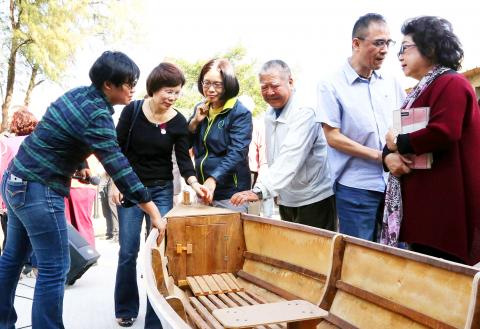Kaohsiung’s Cijin Center for Preserving Sampan Boats, dedicated to Cijin District’s (旗津) traditional craft, on Dec. 30 invited students from the Municipal Cijin Elementary School to learn shipbuilding, marking the center’s participation in the city’s cultural heritage educational program.
About 150 students from the school participated in a do-it-yourself demonstration of building the wooden boats.
Kaohsiung Bureau of Education Director Fan Sun-lu (范巽綠) and Democratic Progressive Party (DPP) Legislator Kuan Bi-ling (管碧玲) also attended the event.

Photo: Huang Liang-chieh, Taipei Times
The center, formerly a dormitory compound for naval technicians, was established by National Sun Yat-sen University’s Department of Sociology and received funding from the education department and the Urban Development Bureau, with Kuan playing an important role as the project’s chief promoter.
Kuan said that she encouraged department faculty members and students to get involved in community initiatives and lobbied for the military facility to be put to use.
“The sociology department surprised me with their ability in getting it done so quickly,” Kuan said, adding that the city government and university dean Yang Hung-duen (楊弘敦) were enthusiastic about the program.
“Taiwan is a maritime nation, and its maritime heritage should be a part of education,” Fan said.
“The faculty and students of the sociology department showed extraordinary initiative in preserving and promoting the craft of sampan building through education, and [Kaohsiung] elementary and middle-school principals responsible for cultural education will all come to observe [the work done] here,” Fan said.
An Urban Development Bureau representative said that it hopes the center will become a place of communal and recreational activity in Cijin District.
A Cijin Elementary School drumming team, who won the grand prize at last year’s National Drum Corps Championships, concluded the event by performing an original Taiko drum composition, The Ocean Trilogy.

Alain Robert, known as the "French Spider-Man," praised Alex Honnold as exceptionally well-prepared after the US climber completed a free solo ascent of Taipei 101 yesterday. Robert said Honnold's ascent of the 508m-tall skyscraper in just more than one-and-a-half hours without using safety ropes or equipment was a remarkable achievement. "This is my life," he said in an interview conducted in French, adding that he liked the feeling of being "on the edge of danger." The 63-year-old Frenchman climbed Taipei 101 using ropes in December 2004, taking about four hours to reach the top. On a one-to-10 scale of difficulty, Robert said Taipei 101

Nipah virus infection is to be officially listed as a category 5 notifiable infectious disease in Taiwan in March, while clinical treatment guidelines are being formulated, the Centers for Disease Control (CDC) said yesterday. With Nipah infections being reported in other countries and considering its relatively high fatality rate, the centers on Jan. 16 announced that it would be listed as a notifiable infectious disease to bolster the nation’s systematic early warning system and increase public awareness, the CDC said. Bangladesh reported four fatal cases last year in separate districts, with three linked to raw date palm sap consumption, CDC Epidemic Intelligence

Taiwanese and US defense groups are collaborating to introduce deployable, semi-autonomous manufacturing systems for drones and components in a boost to the nation’s supply chain resilience. Taiwan’s G-Tech Optroelectronics Corp subsidiary GTOC and the US’ Aerkomm Inc on Friday announced an agreement with fellow US-based Firestorm Lab to adopt the latter’s xCell, a technology featuring 3D printers fitted in 6.1m container units. The systems enable aerial platforms and parts to be produced in high volumes from dispersed nodes capable of rapid redeployment, to minimize the risk of enemy strikes and to meet field requirements, they said. Firestorm chief technology officer Ian Muceus said

MORE FALL: An investigation into one of Xi’s key cronies, part of a broader ‘anti-corruption’ drive, indicates that he might have a deep distrust in the military, an expert said China’s latest military purge underscores systemic risks in its shift from collective leadership to sole rule under Chinese President Xi Jinping (習近平), and could disrupt its chain of command and military capabilities, a national security official said yesterday. If decisionmaking within the Chinese Communist Party has become “irrational” under one-man rule, the Taiwan Strait and the regional situation must be approached with extreme caution, given unforeseen risks, they added. The anonymous official made the remarks as China’s Central Military Commission Vice Chairman Zhang Youxia (張又俠) and Joint Staff Department Chief of Staff Liu Zhenli (劉振立) were reportedly being investigated for suspected “serious